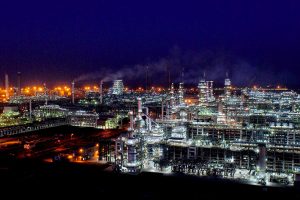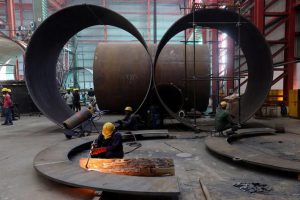Mukesh Ambani — Indian oil tycoon and Asia’s richest man — has said new energy will be just as profitable as the oil-to-chemicals business in the next five to seven years.
Ambani, currently worth over $116 billion, has built his wealth on the back of the Reliance Industries conglomerate, but amid a global energy transition, the company is now expanding into the new energy sector sector.
Reliance’s new energy business includes solar photovoltaic and fuel cell manufacturing, energy storage and green hydrogen production, among others.
Also on AF: Race to Prevent Disastrous Spill From Burning Red Sea Tanker
“I foresee it becoming as big and profitable over the next 5-7 years, as our O2C (oil-to-chemicals) business, which we had built over the past 40 years,” Ambani said at a shareholder meeting on Thursday.

The oil-to-chemicals business currently contributes two-thirds of Reliance’s overall revenue.
The conglomerate operates the world’s biggest refining complex in India, housing two refineries that together churn out about 1.4 million barrels of oil per day.
The refinery is at the heart pf Reliance’s oil-to-chemicals operations, which remain Ambani’s biggest profit drivers, despite his aggressive expansion into retail, telecom and green energy.
Scaling green investments
In 2021, Reliance announced $10 billion of investments to develop its green energy portfolio and achieve its 2035 net zero carbon goal. A year later the group said it would pump in a whopping $80 billion into Gujarat — Ambani’s home state — over the next 10 to 15 years for its clean energy businesses.
Ambani said on Thursday Reliance was on track to make its planned investments.
Reliance will commence the production of its solar photo-voltaic modules by the end of this year, he said, adding that the company will complete the first phase of integrated solar production facilities in the following quarters.
The firm’s green investments also include leasing arid wasteland in Gujarat’s Kutch area, which is home to an expansive white salt desert. Reliance plans to generate about 150 billion units of renewable electricity on the land in the next 10 years, Ambani said.
That would equal about 10% of India’s energy requirements, he added.
The company has also secured land at Kandla port in Kutch for the production, storage and shipping of green fuels to local and global markets, Ambani said.
Reliance’s investments in the green energy business are in-line with global decarbonisation trends, with many firms racing towards net-zero emissions.
Investment in clean energy is far outpacing that in fossil fuels, with the latter accounting for $2 trillion out of the total $3 trillion worth of global energy investment in 2023, according to the International Energy Agency.
Meanwhile, wind and solar combined added more global energy than any other source in 2023, according to an analysis by Carbon Brief.
- Reuters, with additional inputs from Vishakha Saxena
Also read:
40% of Global Energy Generated by Renewables in 2023
Indian Solar Panels Held by US Likely Tied to China Forced Labour
India Now the World’s Third Biggest Generator of Solar Power
Climate Change ‘Fuelled’ Rain That Led to Fatal Indian Landslides
A European Push Could Help India Fill Carbon Removal Gaps
‘Wealthy Nations’ Fossil Fuel Deals Threaten a Global Catastrophe’
Scientists Fear Record Ocean Heat Is Changing Earth’s Systems
Oil Producers, Carmakers Knew of Climate Risk in 1954 – Guardian























